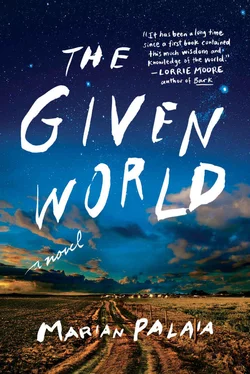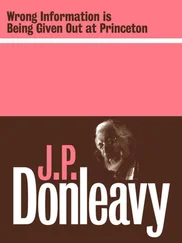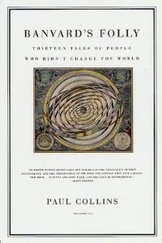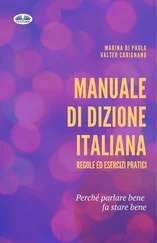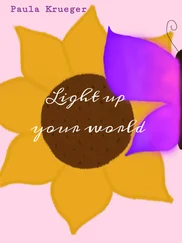So much this time of year is the color of mountain lions. Everything is dry, dry, dry, and grasshoppers appear in great hordes out of nowhere, smacking me in the face and arms and knees. I can sort of feel Slim (which is how he introduced himself, and to which I said, stupidly, “It certainly suits you”) trying to duck behind me, but since he is probably four or five inches taller than I am, I bet it’s difficult, especially since he also has to keep track of a bird. He directs me onto the rez, up a draw, toward the mountains, but not quite into them. The bottomland unrolls to either side of us, tall lion-colored grasses bending almost parallel to the ground in the constant wind.
The house is small and looks as if it has been painted not so long ago. It is a kind of orangey yellow and reminds me of the walls in Mexican restaurants in San Francisco, and the kitchen in Primo’s apartment in the Mission, where I lived only for a short time — nine months or so — but it seemed like so much longer.
I think about Primo adopting me when I was down to close to nothing, and who tried cold turkey first, and then treatment, and then God, and finally drove his newspaper truck into the ocean at Baker Beach. He was the second one to go, if my brother was the first. Lu kind of surprised me, tenacious as she was about living, but still the while trying to kill herself as indirectly as possible. I heard somewhere that Max had spent some time on the AIDS ward at General — Christopher at his side daily — and then made it back into the world. Cole got a new heart and Eddie finally got infected, needing to prove he was not immune, but the drugs have taken, and San Francisco takes care of her own. So some do make it out alive. Yay for people who can fix other people. Yay for the retrovirals. Yay for hanging in there.
After about fifteen lost years ending in exactly six excruciating church-basement meetings, I did finally realize I could save only myself. And as much as it goes against every reality I have ever created or lived through, those meetings — that passively but persistently annoying prodding — ultimately did make things about half as hard, more or less. I took Levon Helm’s word for it and took what I needed. The rest, I left. He also said (in a song about war) it was wrong to take the best ones. But aren’t they the easiest picking somehow? Standing there all bright and shiny and good, waving their stupid hands and calling attention to themselves, like they do. Did. Pick me. Pick me. How thoughtless. How fucking ill-advised.
Slim backs off the bike, arm still held aloft, talking softly now to the restless falcon. He doesn’t move away right away, and I can tell he is waiting for me to give some indication of what I am going to do. Maybe he thinks my instinct — paleface on the rez — is to say good-bye and go, but for right now, I am pretty much rooted to this spot.
The door opens, and an old man is standing there, too old to mistake for even one fleeting second for someone who would still be decades younger. He has a walking stick in one hand and shades his eyes with the other, even though the sun is behind the house — high still but heading for the horizon.
“Where’d you find this one?” he asks, but it is impossible to tell which one of us he is talking to. Slim tilts his head forward and raises his eyebrows at me. When I don’t say anything, he shrugs.
“She was out on the highway, Uncle. West side.”
“Does she want to come in? For coffee?”
Slim starts to open his mouth, probably to say, “Hard telling what she wants,” but I say, “No, I have to get back home. But thank you for asking.”
“Well, then,” the old man says, “if you’re sure. Thanks for bringing the kid back.” He salutes and disappears into the house. I turn the key in the ignition, put my foot on the kick-starter. The kid nods, as if this makes sense, and I stomp down once, but it is not hard enough, and the motor doesn’t catch.
“Crap,” I say. Then, “I’m sorry.”
He cocks his head, just like that bird, narrows his eyes, and pulls his eyebrows together. “Do I know you?”
I say, “I don’t think so. Why?”
“I don’t know,” he says. “Just — I don’t know.”
“I only got back to town a few months ago,” I say.
“From where?”
“California.”
“Why’d you come back here?”
“Family stuff.”
“Yeah,” he says, “I get that.” He offers the hand that doesn’t have a bird attached, and I reach for it, squeeze, and let go. “Anyway,” he says, “thanks for the ride.”
I say, “No problem,” and give the bike another stomp. This time it starts. Slim backs away, waves, and turns to head for the house. I look past him at the still-open door, but since the sun is directly in my eyes now, I can’t see anything behind it — can’t see if anyone else is in there, watching me watch my son walk, for the first time.
15. All That Water. All Those Bridges
My father dies. Peacefully, as they say, in his sleep. They also say dying like he did feels like drowning. Right now I wonder if there is anything that doesn’t.
We were never, that I can recall, very close to many of the neighbors or the folks in town, though we did know some well enough to call them friends. My mom and dad went to PTA meetings, gatherings at the grange hall, to dances sometimes. But we lived a long way out, and it never seemed to matter that we just had each other to hang around with. When it comes time to plan a memorial, or a wake, or whatever, then we are sort of at a loss. And by “we,” I guess I mean “I,” since my mother wants no part of it.
The second night, after he has been gone for one full day, she comes outside at midnight to meet me on the grass. She leans back on her hands, legs stretched straight out in front of her, face to the sky, hair loose and brushing the ground behind her.
“What if,” she says, “you only ever got to see this once.”
“What?” I say, but it is only a reflex. I am not blind.
“All these stars,” she says, pretending my question really does require an answer, like I’m sure she did at least a million times when I was a kid. “The doves and the piglets.” It has never occurred to me that maybe she was the one who taught a lot of these things to Mick in the first place. Or to me, and I just gave all the credit to Mick. Is that possible, as clearly as I think I remember it all?
“I don’t know,” I say. “I bet it would kind of blow your mind.”
“You’d never stop talking about it,” she says. “Not ever.”
I close my eyes for a minute and reopen them to watch the sky explode. I do this over and over. Every time it is different. Every time it is the most miraculous thing.
I feel her lie down beside me, and she slides her hand toward mine so just the outer edges of our little fingers are touching. “Thank you for coming home,” she says.
I can’t believe she’s thanking me. Now. I think, All that water. All those bridges . “Mom—” I say, quietly, instead of hollering.
She says, “I know, Riley. We were never meant to be perfect. Especially you and me. Maybe we didn’t do it right, but we did it.”
Whatever it is. I am happy for her. For getting to that place. And I can do this thing: meet her halfway. “Thank goodness we weren’t meant to be perfect.”
She laughs. It is like seeing the night sky for the first, and only, time.
• • •
I pull it together long enough to put a notice in the paper saying if anyone wants to drop by the house on Saturday, that would be really nice. We’ve already had him cremated, so there is no casket or cemetery to deal with. Mom says he would have hated that part anyway; would have preferred instead to be buried in the backyard, or chucked into the river. She was all for either of those options, but for some reason I decided it would be better to leave at least a couple of laws unbroken.
Читать дальше
